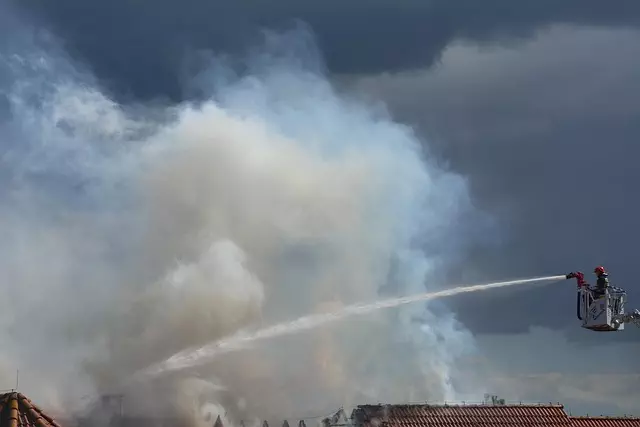When selecting a fire extinguisher at Fire Extinguisher Sales Spring Lake, understand that different types target specific fire classes (A, B, C) and hazards. For homes, multi-purpose dry chemical extinguishers are versatile, but specialized options like CO2 or water mist may be better for areas with grease buildup or hazardous chemicals. Spring Lake residents should consult professionals to choose the ideal extinguisher tailored to their needs, avoiding common mistakes like misjudging types or prioritizing price over quality.
“Fire Extinguisher Sales Spring Lake: Navigating Common Pitfalls and Ensuring Safety
In every home, having a reliable fire extinguisher is crucial. However, purchasing one isn’t as simple as it seems. This guide aims to equip you with the knowledge to avoid common mistakes during Fire Extinguisher Sales Spring Lake. We’ll delve into different fire extinguisher types and their applications, from Class A to C fires. Learn how to make informed choices, considering quality over price, local regulations, and trusted vendors for optimal fire extinguisher sales for homes.”
- Understanding Fire Extinguisher Types for Optimal Protection
- – Different types of fire extinguishers and their uses
- – Class A, B, C fires explained
- Common Mistakes to Avoid During Fire Extinguisher Sales
Understanding Fire Extinguisher Types for Optimal Protection
When considering fire extinguisher purchases, understanding the various types available is crucial for ensuring optimal protection. Fire extinguisher sales in Spring Lake often cater to distinct needs depending on the setting—whether it’s a residential home or a commercial space. Each type of fire extinguisher is designed to combat specific classes of fires: Class A (ordinary combustibles like wood, paper, and cloth), Class B (flammable liquids and gases), Class C (electrical fires), and sometimes combined Classes ABC.
For homes, multi-purpose dry chemical fire extinguishers are commonly recommended due to their effectiveness against all three classes of fires. However, for spaces with specific risks—like kitchens with grease buildup or laboratories with hazardous chemicals—specialized extinguishers like carbon dioxide (CO2) or water mist might be more suitable. Fire extinguisher sales professionals can guide buyers in making informed decisions based on these considerations, ultimately enhancing safety measures in various environments.
– Different types of fire extinguishers and their uses
When it comes to fire safety, investing in a suitable fire extinguisher is non-negotiable. However, with various types available, making an informed decision can be challenging. Understanding the different fire extinguisher types and their applications is essential for effective fire protection. Fire extinguishers are classified based on the type of fires they are designed to combat: Class A (for solid combustibles), Class B (for flammable liquids), Class C (for electrical fires), and sometimes, more specialized classes like Class K (for cooking oils and fats). For home use, multi-purpose fire extinguishers, often labeled as Class ABC, offer a broad range of protection. In Spring Lake, professional fire extinguisher sales experts can guide homeowners in selecting the ideal units based on factors like size, ease of use, and specific fire hazards within the residence.
– Class A, B, C fires explained
When considering fire extinguisher purchases, understanding different fire classes is crucial. Fire Extinguisher Sales Spring Lake professionals often emphasize this as a key step in selecting the right equipment. Fires are categorized into three main types: Class A, B, and C. Class A fires involve solid materials like wood, paper, or cloth, and are typically the most common household blazes. These fires require fire extinguishers designed for ordinary combustibles. Class B fires, on the other hand, involve flammable liquids such as paint, gasoline, or oil, necessitating a different extinguisher type. Class C fires are electrical fires, posing unique challenges that call for specialized equipment to safely douse the flames without risking electrocution.
Fire extinguisher sales for homes vary based on these classifications. Different fire extinguishers are designed to tackle specific classes effectively. For instance, a multi-purpose dry chemical extinguisher is suitable for Class A and B fires but not electrical (Class C) ones. Water-based extinguishers are excellent for Class A fires but not for flammable liquids or electrical hazards. Understanding your home’s potential fire risks will guide you in choosing the right fire extinguisher type for optimal protection during Fire Extinguisher Sales Spring Lake.
Common Mistakes to Avoid During Fire Extinguisher Sales
When it comes to fire extinguisher sales in Spring Lake, there are several common mistakes that homeowners and businesses alike should be aware of to ensure they’re making an informed decision. One of the most frequent errors is not understanding the different types of fire extinguishers available. Each type is designed for specific classes of fires (A, B, C, D, or K), so it’s crucial to know which will be most effective in your specific situation. For example, a water-based extinguisher (type A) is ideal for ordinary combustibles like wood and cloth, while a dry chemical extinguisher (type BC) is better suited for electrical fires.
Another mistake to avoid during fire extinguisher sales for homes is settling for the cheapest option without considering quality and reliability. While price is an important factor, investing in a high-quality extinguisher from a reputable manufacturer can make all the difference when seconds count. Additionally, ensure that the extinguisher you choose meets local safety standards and has current certifications. Don’t be swayed by flashy marketing or unproven claims; stick to trusted brands known for their effectiveness and durability.


